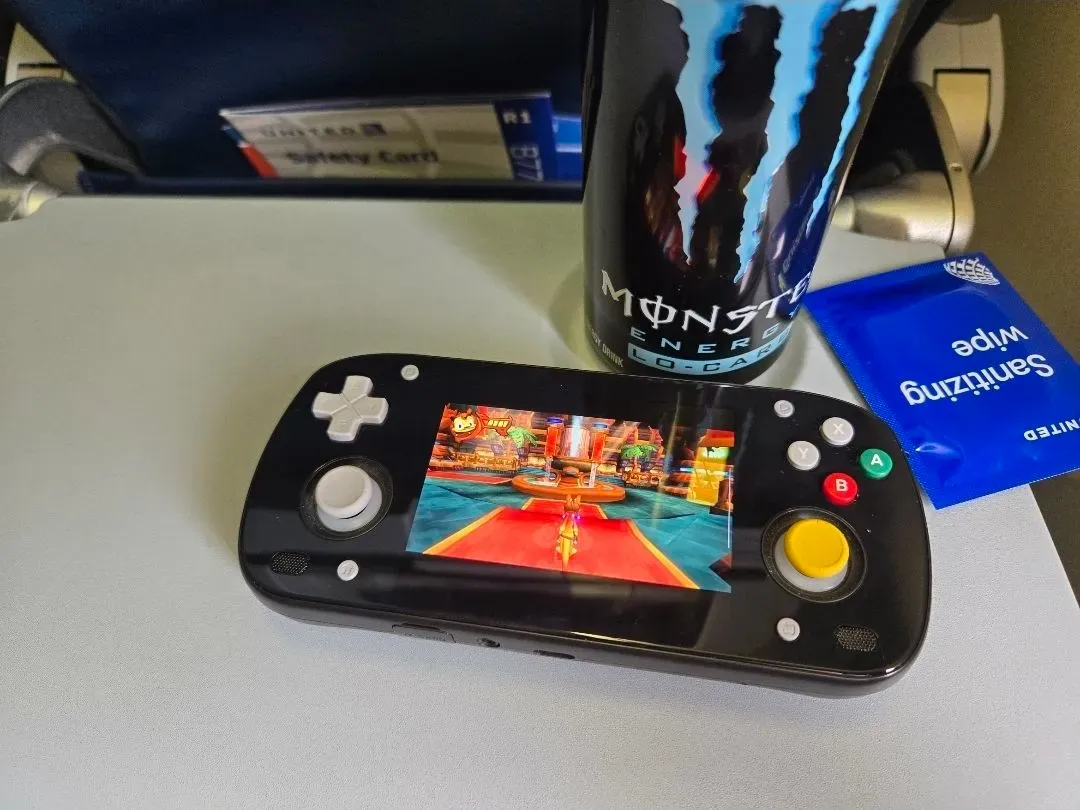Retroid Pocket Mini Review
Compact and powerful Retroid Pocket Mini V1 shines in emulation, but screen issues and mishandled support leave fans frustrated.

Table of Contents
Summary
The Retroid Pocket Mini V1 is a very compact and capable handheld, especially for retro emulation. It handles PS2 and GameCube titles surprisingly well for its size and has excellent battery life. However, its screen situation and how Retroid handled the V1 vs V2 controversy leave a sour taste. My review is entirely from a V1 perspective, and the experience is genrally good but caution is advised.
Specs as Reviewed – Retroid Pocket Mini V1
- CPU: Qualcomm Snapdragon 865
- GPU: Adreno 650
- RAM: 6GB LPDDR4x
- Storage: 128GB UFS 3.1, expandable via TF Card Slot
- OS: Android 13
- Display: 3.92" AMOLED, 1240x1080 resolution at 60fps (usable 3.7" 4:3)
- Battery: 4000mAh
- Connectivity: Wi-Fi 6, Bluetooth 5.1
- Input: Hall Effect 3D analog sticks, analog L2/R2 buttons
- Cooling: Active-cooling system for sustained performance
Design and First Impressions
The RP Mini is compact and pocketable, with a glossy screen that does pick up fingerprints. Build quality feels solid, though the full glass panel made me nervous since I already broke a screen protector. Internally, it’s very easy to mod, and the space is used efficiently. I purchased some GameCube themed RP5 buttons and sticks to modify my unit
Controls, Buttons, and UI
The sticks feel good and protrude a bit, which led to me losing one when sliding the device into my pocket. Modding it with RP5 sticks improved the feel and allowed a more personal configuration. The analog L2/R2 and Hall Effect 3D sticks work well for retro titles, making gameplay precise.
Screen
This is where things get controversial. The V1 uses a 3.92" AMOLED panel, but Retroid cut off the top and bottom, giving a usable 3.7" 4:3 area. The advertised resolution of 1280x960 isn’t native—the panel actually receives a 1280x960 signal but scales it down to approximately 1240x930. Community testing confirms the active area is ~928p. This scaling issue caused frustration among early buyers, and Retroid’s handling of refunds and complaints was poor. Many users who were upset about the misrepresented display had their accounts allegedly banned on Discord, and returned units were often refunded less if there were signs of use. The V2 was introduced to fix these issues, but I opted to keep my V1 for this review. While the screen is bright and crisp, the controversy cannot be ignored.
Performance
Even with the V1’s quirks, performance is solid. It handles PS2 and GameCube emulation with ease, and I never felt the need for additional RAM beyond the 6GB provided. Wi-Fi 6 works flawlessly, and the active-cooling system prevents throttling in most scenarios.
Battery Life
Battery life is a standout feature. On Game Boy emulation, I easily got 14 hours of runtime, and it comfortably survived long flights and a full day of gaming. For a device this size, it’s truly impressive and reliable.
Heat Management
Heat is generally well managed. The only time I saw concerning temperatures was when my wife accidentally covered it with a pillow while it was charging and running a game. Even then, it handled the situation safely without permanent issues.
Ergonomics
The Mini is best suited for small-handed users. The back bumps are just enough to allow comfortable gameplay for 6-hour sessions of retro titles like Final Fantasy II. It’s highly portable, smaller than a typical iPhone, and easy to pocket or transport.
Final Thoughts
The Retroid Pocket Mini V1 is compact, capable, and fun to use for retro gaming. Its performance and battery life are excellent, but the screen controversy and Retroid’s handling of the V1 vs V2 situation are significant negatives. The device itself is impressive, but the company’s missteps tarnish the experience for many early adopters. My review is strictly from a V1 perspective and should be considered in that context. I would like to note that you should be aware of potential scaling issues if buying a used v1, outside of that, Retorid only sells the v2 now, and it's probably what I'd recommend.
Credits & References
- Official Retroid Pocket Mini page: https://www.goretroid.com/products/retroid-pocket-mini-v2-handheld/
- Article compiled by: HandHeldModz
